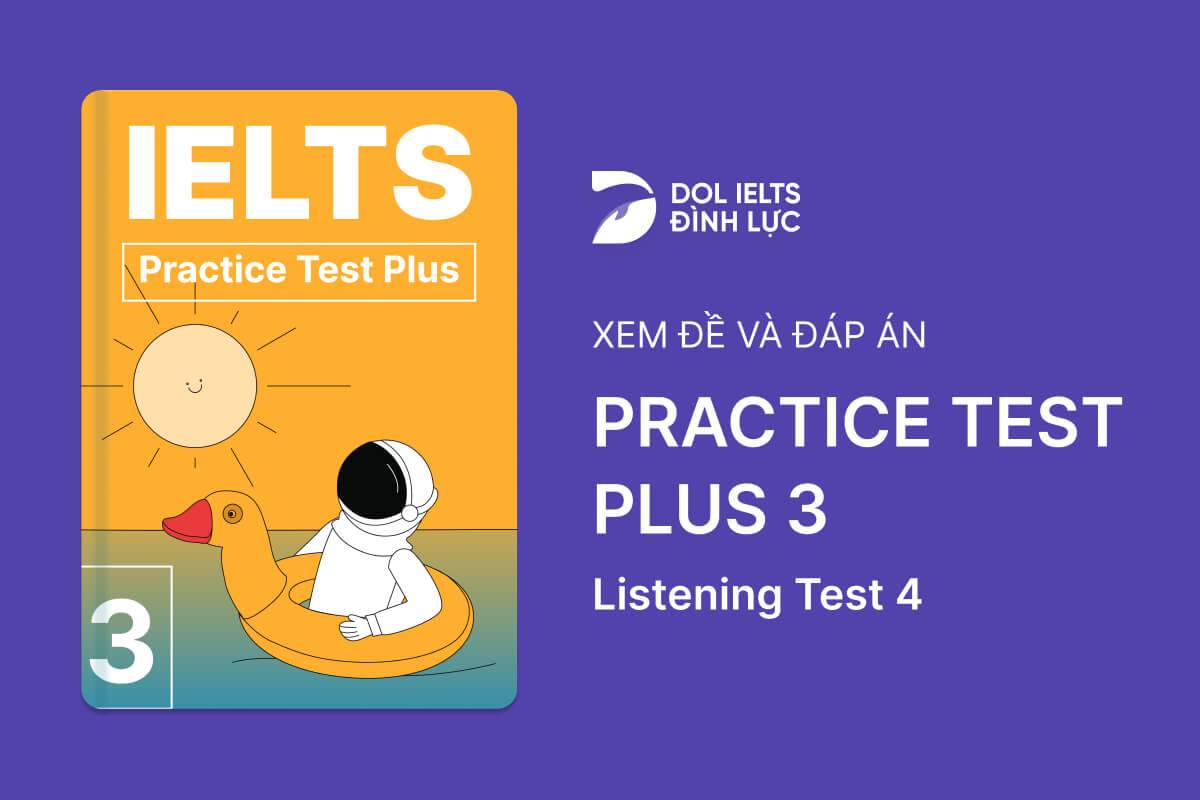Đề thi IELTS Online Test Practice Test Plus 3 - Listening Test 4 - Download PDF Câu hỏi, Transcript và Đáp án
Luyện tập đề IELTS Online Test Practice Test Plus 3 - Listening Test 4 được lấy từ cuốn sách Practice Test Plus 3 với trải nghiệm thi IELTS trên máy và giải thích đáp án chi tiết bằng Linearthinking, kèm answer key và list từ vựng IELTS cần học trong bài đọc.
Section
👂️ Bài nghe section 1
Collect the currency
Cancel appointment with the
(Monday)1
Begin taking the
(Tuesday)2
Buy
,3a small bag,
a spare
,4an electrical
5
Book a
6
Feed the cat
Water the plants
Meet the heating engineer on
10
❓ Tapescript section 1
🔥 Đáp án & giải thích section 1
Giải thích chi tiết
 Mình cần nghe xem cuộc hẹn phải hủy là với ai
Mình cần nghe xem cuộc hẹn phải hủy là với ai
=> Biết đáp án sắp tới khi nghe "wasn’t there an appointment you said you’d got to cancel?"
 Nghe thấy "the hairdresser" và "I'll do it first thing on Monday"
Nghe thấy "the hairdresser" và "I'll do it first thing on Monday"
=> Đáp án: hairdresser 
Section
👂️ Bài nghe section 2
❓ Tapescript section 2
🔥 Đáp án & giải thích section 2
Giải thích chi tiết
 Mình cần nghe xem tại sao Film Festival started
Mình cần nghe xem tại sao Film Festival started
=> Biết đáp án sắp tới khi nghe "The festival was started in nineteen ninety six...."
 Nghe thấy nhắc tới "Adbourne had run a classical music festival which had been becoming less and less popular"
Nghe thấy nhắc tới "Adbourne had run a classical music festival which had been becoming less and less popular"
 Nghe tiếp thấy "Joanne was looking around for something to replace it and to use funds allocated to it to promote something which local people can enjoy"
Nghe tiếp thấy "Joanne was looking around for something to replace it and to use funds allocated to it to promote something which local people can enjoy"
=> Lễ hội nhạc cổ điển không được nổi tiếng lắm, nên Joanne quyết định thay thế nó và dùng ngân sách của lễ hội này để quảng bá thứ khác
=> Dẫn đến sự ra đời của Film Festival
=> Đáp án là C 
Section
👂️ Bài nghe section 3
❓ Tapescript section 3
🔥 Đáp án & giải thích section 3
Giải thích chi tiết
 Mình cần nghe lý do Leela và Jake chọn article này
Mình cần nghe lý do Leela và Jake chọn article này
=> Biết đáp án sắp tới khi nghe "tell me a bit about the article and why you chose it"
 Nghe thấy "we selected the article because [...] it seemed an accessible topic, even though we weren’t familiar with the technique"
Nghe thấy "we selected the article because [...] it seemed an accessible topic, even though we weren’t familiar with the technique"
=> Lý do chọn bài báo này là do chủ đề có vẻ đơn giản dễ hiểu(straightforward), cho dù speaker không biết rõ hay quen thuộc với các kỹ thuật liên quan tới nó
=> Không phải quen thuộc với tất cả sinh viên
=> Loại đáp án A
=> Chọn đáp án C
=> Chọn đáp án C 
Section
👂️ Bài nghe section 4
❓ Tapescript section 4
🔥 Đáp án & giải thích section 4
Giải thích chi tiết
 Mình cần nghe xem các workers tham gia vào bài nghiên cứu làm việc ở đâu (Workers involved in the study were employed at a ___)
Mình cần nghe xem các workers tham gia vào bài nghiên cứu làm việc ở đâu (Workers involved in the study were employed at a ___)
=> Biết đáp án sắp tới khi nghe "the study I looked at had investigated .... and levels of job satisfaction amongst workers"
 Nghe thấy "employees at a call center had been asked to complete a questionnaire"
Nghe thấy "employees at a call center had been asked to complete a questionnaire"
=> Các nhân viên làm questionnaire làm việc ở call center
=> Đáp án: call center 


